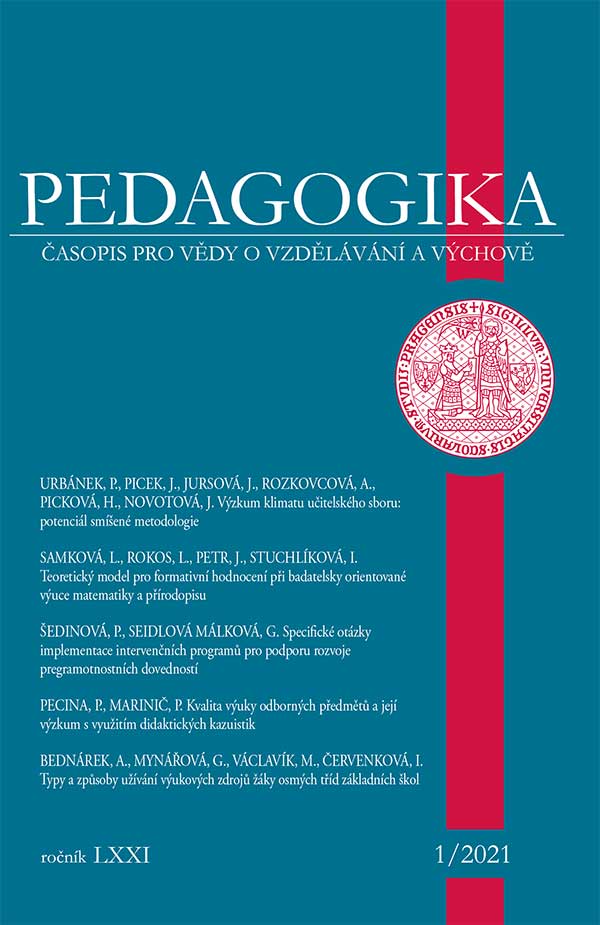The Quality of the Teaching of Vocational Subjects and its Research using Didactic Case Studies
DOI:
https://doi.org/10.14712/23362189.2020.1723Keywords:
quality of teaching, research on the quality of teaching, didactic case study, didactic case study in teaching vocational subjectsAbstract
The empirical study presented here is devoted to a hitherto little-researched area, that of using didactic case studies for research on the quality of the teaching of vocational subjects in secondary schools. The aim of the study is to define the specifics of the quality of teaching in the conditions of technical vocational education and research into that using didactic case studies. Furthermore, we present the main findings from a didactic case study realised in the teaching of a technical vocational subject at a secondary technical school in Brno in 2019. Research methods: A qualitative approach was applied in the research using a didactic case study. The results provide information about the possibility of examining the quality of the teaching of technical vocational subjects using didactic case studies and also provide insights into the specific educational situation and its evaluation. The conclusions help to define and identify the examination of the quality of the teaching of technical vocational subjects.
References
Beaty, L. (1999). Supporting learning from eperience. In H. Fry, S. Ketteringe & S. Marshall (Eds.), A handbook for teaching and learning in higher education (s. 134-147). Glasgow: Kogan Page.
Blings, J., & Gessler, M. (Eds.). (2007). Quality development and quality assurance with labour market reference for the vocational education and training system in the metal sector. Results from the European Leonardo Project QualiVET. Analysis reports from Austria, Czech Republic, Germany, Netherlands, Slovenia, Spain and United Kingdom. Bremen: Perspektiven-Offset-Druck.
Bromme, R. (2008). Pedagogical contens knowledge jako konceptuální východisko pro výzkum moudrosti praktiků. In. T. Janík et al., Metodologické problémy výzkumu didaktických znalostí obsahu (s. 9-16). Brno: Paido
Bruner, J. S. (1966). Toward a theory of instruction. New York: W. W. Norton.
Carroll, J. B. (1963). A model of school learning. Teachers College Record, 64(8), 723-733.
Davis, C., & Wilcock, E. (2003). Teaching materials using case studies. Liverpool: The UK Centre for Materials Education.
Česká školní inspekce. (2020). Kritéria hodnocení podmínek, průběhu a výsledků vzdělávání na školní rok 2020/2021. Dostupné z www.csicr.cz/cz/Kvalitni-skola
Fend, H. (2008). Schule gestalten: Systemsteuerung, Schulentwicklung und Unterrichtsqualität. Wiesbaden: VS Verlag.
Fjellström, M. (2014). Vocational education in practice: A study of work-based learning in a construction programme at a Swedish upper secondary school [Odborné vzdělávání v praxi: Studium pracovního učení ve stavebním programu na švédské střední škole]. Empirical Research in Vocational Education and Training, 6(2).
https://doi.org/10.1186/1877-6345-6-2
Helmke, A. et al. (2007). Der Ratingbogen der DESI-Videostudie. Dostupné z www.uni-landau.de
Hrmo, R., & Krpálková, K. (2010). Zvyšovanie kvality vyučovacieho procesu. Bratislava: Slovenská technická univerzita.
Janík, T., Slavík, J., Mužík, V., Trna, J., Janko, T., Lokajíčková, V., … Zlatníček, P. (2013). Kvalita (ve) vzdělávání obsahově zaměřený přístup ke zkoumání a zlepšování výuky. Brno: Masarykova univerzita.
Kolektiv autorů. (2010). AUTOMOBILY, motory (3). Brno: AVID.
Michek, S. (Ed.). (2007). Rozvoj kvality odborného vzdělávání v Evropě. Praha: Národní ústav odborného vzdělávání.
Michelsen, S., & Sternström, M. L. (2017). Vocational education in the Nordic countries: The historical evolution. London: Routledge
https://doi.org/10.4324/9781315411811
Průcha, J. (2019). Odborné školství a odborné vzdělávání: Fungování systému, problémy praxe a výzkum. Praha: Wolters Kluwer.
Rauner, F., & Maclean, R. et al. (2009). Handbook of technical and vocational education and training research. New York: Springer.
https://doi.org/10.1007/978-1-4020-8347-1
Slavík, J., Janík, T., Najvar, P., & Knecht, P. (2017). Transdisciplinární didaktika: O učitelském sdílení znalostí a zvyšování kvality výuky napříč obory. Brno: Masarykova univerzita.
https://doi.org/10.5817/CZ.MUNI.M210-8569-2017
Starý, K., & Chvál, M. (2009). Kvalita a efektivita výuky: metodologické přístupy. In M. Janíková, K. Vlčková et al. (2009), Výzkum výuky: Tematické oblasti, výzkumné přístupy a metody. Brno: Paido.
Trna, J. (2016). Fyzika: Záhadná setrvačnost těles v jednoduchých experimentech. In T. Janík et al., Kvalita (ve) vzdělávání obsahově zaměřený přístup ke zkoumání a zlepšování výuky. Brno: Masarykova univerzita.
Vaněček, D. et al. (2016). Didaktika technických odborných předmětů. Praha: ČVUT.
Walberg, H. J. (1980). A psychological theory of educational productivity. In F. H. Farley & N. J. Gordon (Eds.), Psychology in education (s. 81-110). Berkeley: McCutchan.
Downloads
Published
Versions
- 2021-04-08 (2)
- 2021-04-08 (1)



